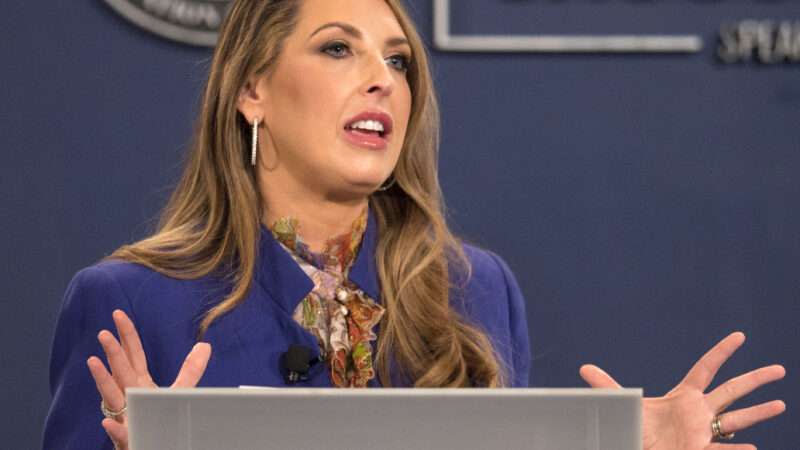Ronna McDaniel and the Media's Election Denial Double Standard

Ronna McDaniel's tenure as an on-air commentator for NBC News is already over: The network fired the former Republican National Committee (RNC) chairwoman this week after enduring a full-on mutiny from other staffers and hosts. MSNBC pundits Chuck Todd, Joe Scarborough, and Rachel Maddow all criticized network heads for bringing McDaniel on board. Todd suggested her commentary would be suspect, since she had only recently departed the RNC; Scarborough said he "strongly objected" to her; and Maddow said the network hiring McDaniel was like hiring a mobster to work at a district attorney's office or a pickpocket to work as a TSA screener (imagine that!). Watch:
"Bad decisions will inevitably happen. Mistakes will be made. But part of our resilience as a democracy is going to be us recognizing when decisions are bad ones and reversing those bad decisions." Rachel Maddow encourages her colleagues at NBC News to 'take a minute' on their… pic.twitter.com/T1FVMh5KIP
— Maddow Blog (@MaddowBlog) March 26, 2024
I criticized Todd's objections to McDaniel earlier this week. If McDaniel's proximity to the RNC means her credibility as a commentator is suspect, then MSNBC host Jen Psaki should be considered a major liability; Psaki served as White House press secretary under President Joe Biden while negotiating her role at MSNBC. There's nothing particularly new or stranger about this—political communications officials frequently move from government to campaigns to cable news and back again. Anyone who pretends that this was the major issue with McDaniel is lying.
Maddow's criticism of McDaniel gets to the actual heart of the matter: Progressives at MSNBC think that McDaniel's political views and actions with respect to former President Donald Trump are disqualifying. They say that McDaniel was part of Trump's efforts to overturn the results of the 2020 election, and for that reason, she has committed an unforgivable sin.
The truth, however, is that McDaniel played an "ambiguous role" in promoting Trumpian election denial, explains Reason's Jacob Sullum. She initially gave credence to wrongful claims by Sidney Powell and Rudy Giuliani, and supported Trump's efforts to re-litigate the outcome, but as promised evidence of fraud failed to materialize, she increasingly distanced the RNC from Stop the Steal—infuriating Trump in the process.
Not Just a River in Egypt
In its write-up of McDaniel's sudden rise and fall at NBC, The New York Times credited her for rejecting "Mr. Trump's most far-fetched election-theft scenarios." Nevertheless, the Times chided her for casting any doubt on the validity of the outcome whatsoever, reminding readers that she once said Biden hadn't "won it fair" and had gestured at various fraud allegations.
In merely whining about the supposed unfairness of election, McDaniel is in good company, of course. Indeed, much of the mainstream media seems to have completely memory-holed the fact that numerous Democratic officials and progressive pundits said the 2016 election—won by Trump—was unfair due to alleged Russian interference, voter suppression, and hacks and leaks emanating from the Hillary Clinton campaign. Clinton herself infamously declared Trump an "illegitimate president."
" I believe he understands that the many varying tactics they used, from voter suppression and voter purging to hacking to the false stories—he knows that—there were just a bunch of different reasons why the election turned out like it did," she said in a 2019 interview.
Clinton was hardly alone in that belief. When Trump was sworn in as president in 2017, nearly 70 congressional Democrats slipped the inauguration; many of them did so because they viewed the election as illegitimate. The late Rep. John Lewis (D–Ga.), a beloved civil rights icon, explicitly said he would not attend the inauguration because "I don't see the president-elect as a legitimate president." The reason he cited was Russian election interference.
"I think there was a conspiracy on the part of the Russians and others," said Lewis.
He made these remarks during an interview with…NBC's Chuck Todd, who somehow failed to assail Lewis for indulging in election-denying conspiracy theories. In fact, Todd's response was downright agreeable. "That's going to send a big message," said the host.
Then there was Stacey Abrams, the Democratic candidate for governor of Georgia in 2018, who repeatedly and brazenly claimed her Republican opponent, Republican Gov. Brian Kemp, had stolen the election. Those claims were echoed by current White House Press Secretary Karine Jean-Pierre—before she took that job—who had also called Trump's win illegitimate.
To be abundantly clear, neither Clinton nor Abrams nor any of these other figures are morally equivalent to Trump, who took active steps to contest his loss in court. But they did gripe about their losses, and help inspire public doubt in the validity of their outcomes. According to Roll Call, 62 percent of Democrats believe Trump's 2016 win was illegitimate because of Russian interference—even though the most sensational claims about vast foreign influence on social media were substantially debunked.
Would NBC hosts rise up in fury if any of these election deniers were offered plum gigs at the network? Of course not.
What's the Story?
I found myself completely baffled by this New York magazine profile of Andrew Huberman, a Stanford University professor of medicine and popular podcaster. Writer Kerry Howley—formerly of Reason—tears Huberman apart for dating multiple women at once (without their knowledge, according to them); the piece reads like an attempted #MeToo-ing, but falls short of offering up anything bad enough to be worthy of such a brutal takedown.
That was my take at least, and Glenn Greenwald and Saagar Enjeti expressed similar sentiments. My Rising co-host Briahna Joy Gray felt differently, however, and we argued about it on the show.
Worth Watching
Did you catch the debut of Free Media TV? Watch below. We're just getting started.
The post Ronna McDaniel and the Media's Election Denial Double Standard appeared first on Reason.com.
